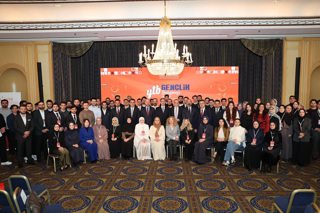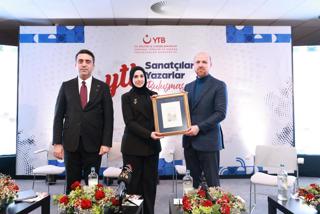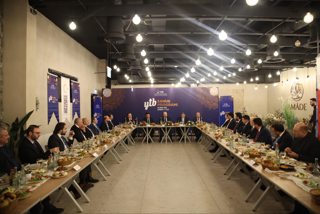Exile and Memory
Salı, Mayıs 28, 2024
Compiled out of the papers submitted to the international symposium on “1989 Forced Migration of Turks From Bulgaria: Perception of Migrants After 30 Years” organized by Yıldız Technical University, the article titled Exile and Memory offers a review of the ethnic cleansing and attempts of assimilation levelled at the Turks in Bulgaria and the Forced Migration in 1989 in great detail.
Once the administration switched hands in Bulgaria in the aftermath of the Russo-Ottoman War in 1877 and 1878, the Turks ended up being a minority in Bulgaria, and faced pressure from time to time onwards whereas none of them was comparable to the atrocities inflicted under the rule of the Communist Party in a period that ranged from 1946 to 1990.
The Turks were forced to change their names and those who spoke Turkish were fined as part of the policy implemented by the Communist Party in 1984 under the title of "Process of Rebirth". Circumcision was banned and the Turks were stopped from performing their religious duties, and the use of elements concerning the Turkish culture was prohibited. Reacting strongly to such practices contrary to human dignity and advocating for their faith and identity, the Turks were sent to the death camp of Belene known as the island of torture. An armed response was staged against the Turks who peacefully protested against such social, cultural, and religious forms of discrimination. An infant aged 18 months named Türkan fell martyr in her mother’s arms as fire was opened into the protesters, including women, children, and the elderly.
As the protests spread around the country, the communist regime took action to deport the Turkish minority. 360,000 Turks moved from Bulgaria to Türkiye as a result of the largest influx of immigrants in Europe after World War II, which rose in numbers in 1989.
The Presidency for Turks Abroad and Related Communities, which is intended to maintain the relations with Turks abroad and related communities in every aspect, organises commemorative events and symposia in cooperation with various organisations and agencies, universities and non-governmental organisations, and takes scores of actions, including but not limited to production of documentaries, short films, almanacs and documentary books in an effort to make sure that the 1989 Forced Migration, which is the largest influx of immigration in Europe, lingers in memories and to raise the awareness of the future generations on this matter.
Compiled out of the papers submitted to the international symposium titled “1989 Forced Migration of Turks From Bulgaria: Perception of Migrants After 30 Years” organized by Yıldız Technical University, the article titled Exile and Memory offers a review of the ethnic cleansing and attempts of assimilation levelled at the Turks in Bulgaria and the Forced Migration in 1989 in great detail.
The first chapter of the book titled ‘Forced Assimilation Pressure, Violence and Forced Migration under the rule of BKP Regime’ covers articles over ‘The Communist Regime's Expropriation of Land and the Establishment of Agricultural Cooperatives (TKZS) in Bulgaria as Narrated by the Turks’, ‘Getting to Know the “Ottoman” as a Bulgarian Turk Subjected to Forced Migration in 1989’, ‘Political Circumstances in Bulgaria ahead of 1989 Based on the Memoirs of the Victims Survivors Detained in Prisons and Concentration Camps‘, “A Case of Torture and Killings Under Custody as part of Assimilation Policy Named ”Rebirth’ (1984-1989), Martyr Ali Osman Ali’, “The Impact of the Assimilation Policy on the Turkish Language and its Assessment from the Perspective of Bulgarian Turks”, “’89 Forced Migration and the Pomaks In the Context of Relations Between Türkiye and Bulgaria”, and “The 1989 Exodus of Turks from Bulgaria Revisited”.
The second chapter of the book titled ‘Trauma of Forced Migration and Migrants: Adaptation, Organisation and Remembrance’, includes articles named ’Investigating the Impact of Migration on People in a Social Context: A Sample out of Edirne’, “Childhood Divided by Borders: Juvenile Migration from Bulgaria to Türkiye”, ’The Early Period of 1989 Migration: Citizenship Experiences of Bulgarian Immigrant Women’, “Associations Founded by Bulgarian Immigrants in Türkiye and Assessment of the Events Organised on the 30th Anniversary of the 1989 Forced Migration”, “Bulgarian Turks in the Aftermath of the 1989 Forced Migration”, “Remembrance and Mourning Days of the Survivors of Forced Assimilation and Ethnic Cleansing in Bulgaria from 1984 to 1989” and ’Dismissed Knowledge: Representation of the Muslim Minorities in Bulgarian Textbooks’.
The chapter three of the book titled ‘Witnesses Speak’ consists of various memoirs describing individual and organised efforts, while the chapter four of the book titled ‘Assessments’ includes articles titled ‘Migration, Terminology, and Impressions Dating to 1984’ and ‘A Brief History of Migration from the Bulgaria to Türkiye under the Rule of the Ottoman Empire and During the Republican Era’.
The chapter ‘Chronology’ provides chronological details of the historical events covered in the book and the developments that led to those events. Finally, there is a chapter titled ‘List of Tables’, which offers an analysis of various facts and events that the book deals with, ranging from ‘Whom/What the decision to migrate Was Based on’ to ‘Territories of Bulgaria Where Turks Suffered Forced Migration came until by May 1990’.
Exile and Memory, with all its content, not only examines in depth the reality of “exile”, the effects of which continue in the memories and lives of Bulgarian Turks from past to present, but also serves as a resource for academics and students following the subject.



